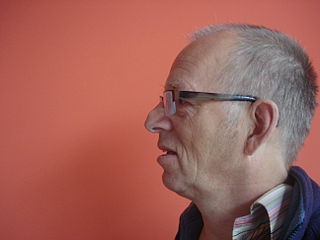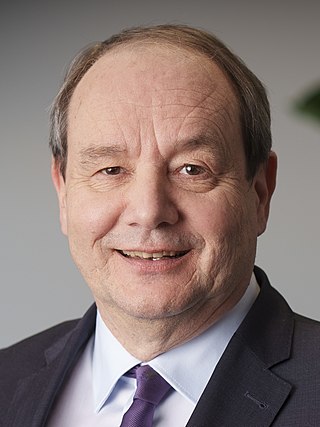Related Research Articles

de Volkskrant is a Dutch daily morning newspaper. Founded in 1919, it has a nationwide circulation of about 250,000.

De Telegraaf is the largest Dutch daily morning newspaper. Paul Jansen has been the editor-in-chief since August 2015. De Telegraaf is based in Amsterdam and is owned by the Belgian company Mediahuis.

The Thrift Savings Plan (TSP) is a defined contribution plan for United States civil service employees and retirees as well as for members of the uniformed services. As of December 31, 2023, TSP has approximately 7 million participants, and more than $845.4 billion in assets under management; it purports to be the largest defined contribution plan in the world. The TSP is administered by the Federal Retirement Thrift Investment Board, an independent agency.
A chit fund is a type of rotating savings and credit association system practiced in India, Bangladesh, Sri Lanka, Pakistan and other Asian countries. Chit fund schemes may be organized by financial institutions, or informally among friends, relatives, or neighbours. In some variations of chit funds, the savings are for a specific purpose. Chit funds are often microfinance organizations.

Prince Bernhard Lucas Emmanuel of Orange-Nassau, van Vollenhoven is a Dutch entrepreneur and a member of the Dutch royal family.

The Special Supplemental Nutrition Program for Women, Infants, and Children (WIC) is an American federal assistance program of the Food and Nutrition Service (FNS) of the United States Department of Agriculture (USDA) for healthcare and nutrition of low-income pregnant women, breastfeeding women, and children under the age of five as part of child nutrition programs. Their mission is to be a partner with other services that are key to childhood and family well-being. WIC serves 53% of all infants born in the United States.

KiwiSaver is a New Zealand savings scheme which has been operating since 2 July 2007. Participants can normally access their KiwiSaver funds only after the age of 65, but can withdraw them earlier in certain limited circumstances, for example if undergoing significant financial hardship or to use a deposit for a first home.
A rotating savings and credit association (ROSCA) is a group of individuals who agree to meet for a defined period in order to save and borrow together, a form of combined peer-to-peer banking and peer-to-peer lending. Members all chip in regularly and take turns withdrawing accumulated sums.

Josephus Johannes Maria (Jos) van der Lans is a cultural psychologist, journalist and writer. Between 1999 and 2007 he was member of the Dutch Senate for GreenLeft
Squatter's Delight or In Krakende Welstand is a 1990 Dutch drama film directed by Mijke de Jong. It was written by de Jong and Jan Eilander. The film was de Jong's first and she won the prize of the city of Utrecht at the Netherlands Film Days.

Pieter Herman Omtzigt is a Dutch politician who has served as a member of the House of Representatives since 2003 apart from a short interruption between June and October 2010. He was member of the Christian Democratic Appeal (CDA), but left in 2021 and continued as independent. In August 2023, he founded a new party called New Social Contract, its name taken from his 2021 manifesto. Three months later, his party won 20 out of 150 seats in the 2023 Dutch general election.

Joram Jaron van Klaveren is a Dutch politician. As a member of the Party for Freedom he was an MP from 17 June 2010 until 21 March 2014. He subsequently was an independent until his term in office ended on 23 March 2017. He focused on matters of desegregation, employment-to-population ratio, egalitarianism and emancipation. From 24 March 2011 until 11 June 2014, he also was a member of the States-Provincial of Flevoland. He became well-known for anti-Muslim comments. In October 2018, he converted to Islam halfway through writing an anti-Islam book. After becoming a Muslim, he decided to rededicate his book to his search for religiosity and the subsequent conversion to Islam. His book titled Apostate: From Christianity to Islam in Times of Secularisation and Terror was published in both Dutch and English.
YouCaring was a crowdfunding website for personal, medical, and charitable causes. The company was a Certified B corporation based in San Francisco, California. YouCaring did not take a percentage of funds raised on its site, or charge those raising funds a fee. The company relied on voluntary donations from donors to fund operations. YouCaring was acquired by GoFundMe in 2018.

Wim van Norden was a Dutch journalist. He was one of the founders of the resistance paper Het Parool during World War II. He was jailed for six months by the Germans in 1942 but was later released due to lack of evidence for his involvement with Het Parool. Van Norden was active in the resistance for the remainder of the war. After the war he became director of the newspaper and although he originally planned to serve for only several months he kept his function until 1979. Van Norden was responsible for the founding of the publishing company Perscombinatie in which three newspapers worked together.
Crowdfunding is the practice of funding a project or venture by raising money from a large number of people, typically via the internet. Crowdfunding is a form of crowdsourcing and alternative finance. In 2015, over US$34 billion was raised worldwide by crowdfunding.

Pepijn van Erp is a Dutch mathematician and skeptical activist.

Johannes Alexander "Hans" Vijlbrief is a Dutch civil servant, economist, and politician, currently serving as a member of parliament for the social-liberal party Democrats 66 (D66). He previously served as State Secretary for the Extractive Industries in the Fourth Rutte cabinet.
Keeping It Real Art Critics is a web series on YouTube and Vimeo exploring the international art world. Directed by Stefan Ruitenbeek, a Dutch artist and director, KIRAC episodes occupy the middle ground between art and art criticism and focus mainly on the influence of modernistic, democratic principles within the art world. In the Netherlands, the platform has gained both praise and notoriety as a result of its confrontational, dialectical approach.

Joris Thijssen is a Dutch environmental activist and politician. After studying aerospace engineering, he started working for the environmental organization Greenpeace. He participated in numerous protest actions, leading to a number of arrests and a criminal record. In 2016, he became co-director of Greenpeace Netherlands. He left his job to participate in the 2021 general election, in which he was elected to the House of Representatives. There, he represents the Labour Party.
Anti-fascist research group Kafka, commonly abbreviated to Kafka, is a Dutch anti-fascist and far-left research group. Its name was said to be an acronym for Kollektief Anti-Fascistisch/-Kapitalistisch Archief before 1994, but the research group has since indicated that they had named themselves after the writer Franz Kafka.
References
- ↑ Klijssen, Heidi (13 April 2011). "Broodfonds voor kleine zelfstandigen". Elsevier . Archived from the original on 9 January 2014. Retrieved 16 June 2012.
- ↑ Hilhorst, Pieter (12 July 2011). "'Het Broodfonds' – Pieter Hilhorst – VK". de Volkskrant . Retrieved 16 June 2012.
- ↑ "Zzp-ers verzekeren zich in Broodfonds". EénVandaag . 14 April 2012. Retrieved 16 June 2012.
- ↑ "Broodfondsen: de stand van zaken" . Retrieved 31 May 2015.
- ↑ Boomen, Tijs van den (19 July 2011). "Broodfonds van Pieter Hilhorst is kruimelwerk". de Volkskrant . Retrieved 16 June 2012.
- ↑ Spaninks, Pierre (24 May 2015). "ZZPers, stop niet zomaar geld in broodfondsen". Quote . Retrieved 31 May 2015.
- ↑ "risicodelen provides professional management". Risicodelen cooperation. Retrieved 29 November 2019.
- ↑ Kraak, Haro (13 March 2013). "Uit de soep". de Volkskrant . Retrieved 31 May 2015.
- ↑ "Freelancers zijn nooit ziek". Omroep Brabant . 11 February 2015. Retrieved 31 May 2015.